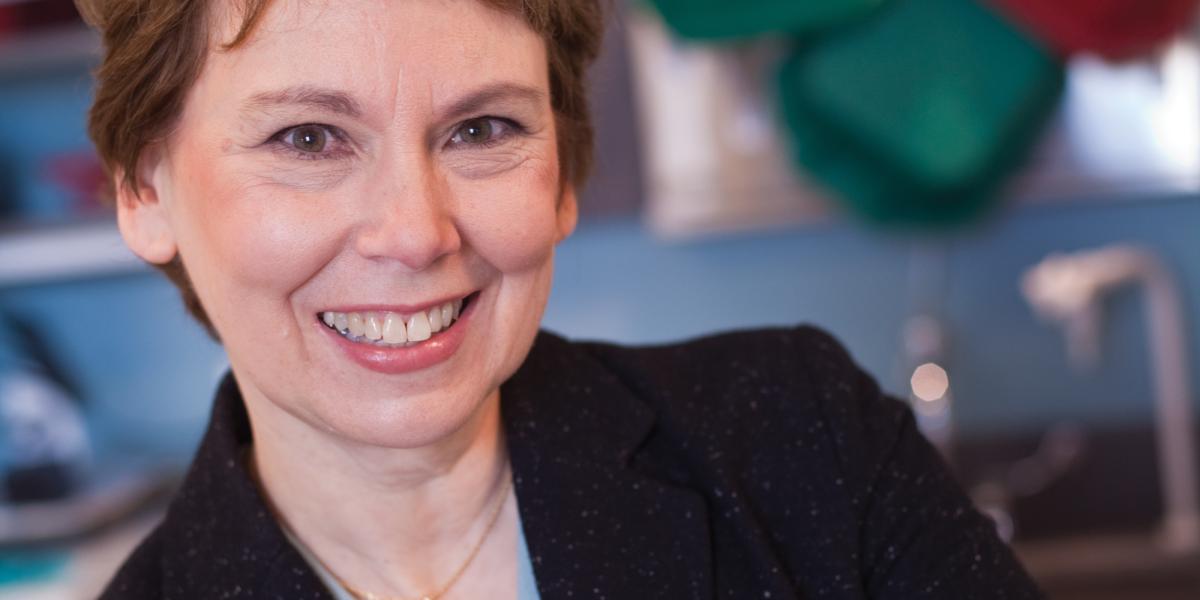No Death, No Life
In the secrets of cells, J. Marie Hardwick discovers philosophy.
Apoptosis, the genetically instilled suicide of cells, offers a brutally clear lesson in survival. It has also yielded other valuable discoveries to J. Marie Hardwick, PhD, who has probed cells and extracted their secrets to existence for more than a quarter century. Along the way, the David Bodian Professor of Molecular Microbiology and Immunology acquired a new appreciation of the importance of cell death to creatures both great and small.
By illustrating just how essential the purposeful suicide of individual cells is to life, Hardwick has shed light on the life-giving nature of cell death. (Without apoptosis, unfettered proliferation can lead to cancer in complex organisms, and to wholesale population loss in simple ones.) Her work has led her, in spare moments away from the bench, to muse on the apparently universal phenomenon of altruistic self-sacrifice and the implications it may have for society.
Is apoptosis really so important? What would happen if we eliminated it?
It’s crucial. The death of cells is required for the survival of organisms. We can make mutants of any complex organism, like a fly or mouse, and inhibit this natural process of cell limitation, and the outcome is either early mortality, or some drastic malformation, or cancer.
Why must cells die?
We need to have new cells born all the time—to repair wounds, to recover from an infection—but we also need to have a secure method for eliminating them after they’ve done their job. If there weren’t a balance between proliferation and death, things would rapidly get out of control.
Is it true that even single cell organisms like yeast kill themselves for the greater good?
There is still some disagreement about [this], but I think it’s pretty clear that even for single-cell species to survive, some of the individual cells need to die: the infected ones, the less fit ones, the ones that in cases of overpopulation would otherwise consume all resources and cause the entire population to die. If you have a death-resistant population of yeast, they’re less likely to survive in the long run; if you have a death-prone population, they’re much more likely to do so. It’s the opposite of what you’d expect, but it just speaks to the importance of altruistic death.
Your studies into cell death in yeast yielded some unexpected results, didn’t they?
We thought that some of the genes found in both yeast and humans might have some role in regulating cell death. But whenever we removed one of those genes from yeast, a mutation cropped up in another, different gene. We didn’t predict that, and we think it is a model for how cancer tumors form: You have one mutation [i.e., a deleted gene] that drives the creation of another mutation, and another, and another.
Then we discovered a family of human genes that are similar to the mutated yeast ones and related to human disease: Several of them have shown up in cancer, and one of them is a new epilepsy gene.
Something similarly unexpected cropped up in an apoptosis study involving a genetically engineered mouse.
There’s a protein called Bcl-xL that normally inhibits apoptosis, but when it’s cleaved by a protease called caspase, it becomes a killer and triggers cell death.
We engineered a mouse to prevent Bcl-xL from being cleaved, and shared it with collaborators at Yale University and Albert Einstein College of Medicine, who used the mouse to study strokes. And they found that the mice with uncleavable Bcl-xL protein were strikingly resistant to neuronal death after a stroke.
That generated some interest because there’s a drug that inhibits Bcl-xL that’s now in clinical trials to kill cancer cells—if you inhibit this normally protective protein with the drug, the tumor cells die. So we used that same drug [the one that kills cancer cells by inhibiting Bcl-xL] to treat mice after a stroke, and it turns out that it protects against cell death in the brain.
Therefore, this drug can inhibit both the survival form and death form of Bcl-xL, and applying this drug to those specific conditions like cancer and stroke is beneficial.
That’s a pretty cool idea: A chemotherapeutic agent might be beneficial in protecting neurons in the brain. I got a few phone calls from excited colleagues about that one. There are diseases like Alzheimer’s where we suffer a lot of neuronal loss. I think if we could improve the survival of neurons in Alzheimer’s, we could improve quality of life.
So will this drug work in Alzheimer’s patients? Or could it be helpful to people with other types of neurodegenerative processes?
[That] is not known. Many different mechanisms can cause neuronal loss, and we are currently seeking [funding] to identify the culprits responsible.
Ours is a great example of how pure basic science leads to important findings for human health.
What does it mean that the same molecule can either kill cells or preserve them?
Evolution has put into place the best security mechanism: What better way to link cell proliferation to cell death than to use the same molecule? Bcl-xL inhibits death, and if it does that too much, you have cancer; but cleave it with caspase, and you can make it kill.
How have these discoveries affected your outlook on biology, and on the balance between life and death in general?
One, death is a good thing because it’s required. Two, maybe we are like these yeasts that have begun to deplete their resources and are going to have to make some tough choices … like slowing population growth, reducing wasteful practices and cutting excesses to preserve remaining resources.
